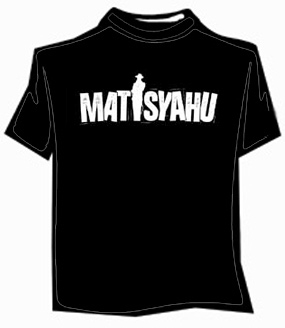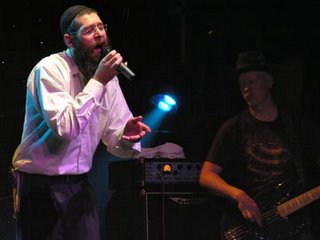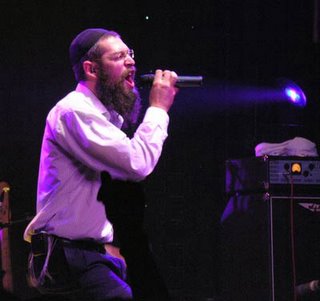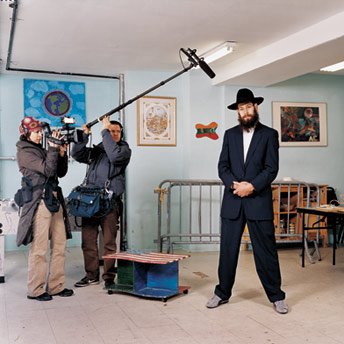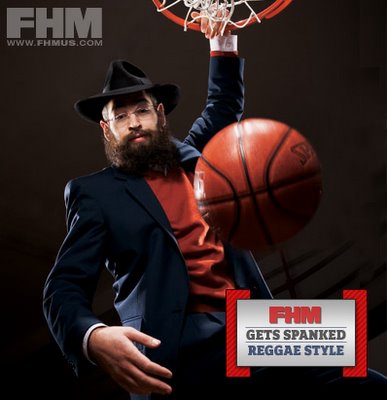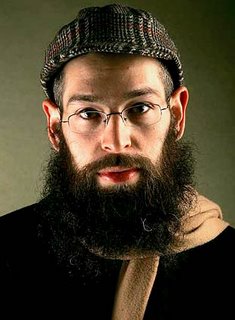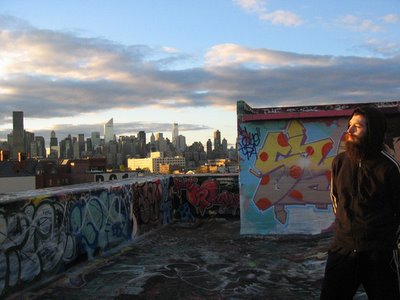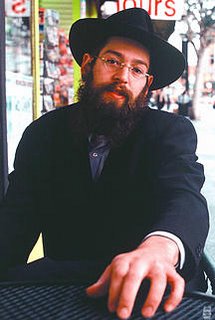NOTHING in the Talmud specifically forbids Orthodox Jews from stage-diving at live gigs. And nowhere does Jewish scripture recommend precisely how one should behave in the mosh pit.
So Jewish reggae phenom Matisyahu had to learn through trial and error that it was a good idea to clip his yarmulke into his hair so it wouldn't fall off when he bobbed his head to a hip-hop beat. And that if he tucked his
tzitzit into his trousers, the tassels of his prayer shawl were less likely to be yanked away in the pit's mass of writhing limbs.
Such are the travails of the world's foremost Hasidic reggae star, a guy who might've sprung fully formed from a United Colors of Benetton ad. He convincingly melds Jamaican roots rock with messages of spiritual uplift peppered with religious imagery, rapping and singing over reggae "riddims" intermixed with ancient Jewish melodies.
Dressed according to Orthodox custom in a starchy black suit and sporting the heavy beard of a yeshiva student, he launched into fans' outstretched hands at the end of nearly every show he performed last year. It became his signature move.
Late last fall, however, Matisyahu, 26, renounced stage-diving after he learned the cherished punk practice could run afoul of Talmudic rules dictating the separation of unmarried women and men. "There could be a girl in a crowd full of guys when you stage-dive," he explained from his home in Brooklyn's Crown Heights. "Women aren't supposed to touch me."
Not exactly the kind of tour worry shared by Mötley Crüe. But it's been no deterrent to stardom. Matisyahu has been on the road for nearly two years straight, a tour that will bring him to the Long Beach Arena Feb. 19. And his 2005 concert CD, "Live at Stubb's" (Sony), has claimed the top spot on the reggae chart for six straight weeks, selling more than 300,000 copies.
"We're moving 25,000 copies of the live album a week," points out Charlie Walk, president of Sony subsidiary Epic Records. "That's spectacular! It's a new movement."
In October, KROQ-FM (106.7) put Matisyahu's single "King Without a Crown" into rotation. The song has ranked among the station's three most requested ever since. "From the first time we played it, the phone reaction was immediate," says KROQ's music director, Lisa Worden. " 'Who was that? We love it!' We decided to jam it based on that response, and it's been huge."
Such buzz bodes well for his March release, "Youth," produced by studio veteran Bill Laswell along with Jimmy Douglass and Ill Factor. It's Matisyahu's first studio album since 2004's "Shake Off the Dust … Arise," and yet another milestone for the man who was once Matthew Miller, a dreadlocked hippie from White Plains, N.Y., with a taste for LSD and a vague religious yearning.
His transformation into an international star of devout faith is a story of two redemptions. One occurred through his embrace of the Chabad-Lubavitch branch of Hasidism, an Eastern European sect of mystical Judaism. The other came via his sonic inspiration, Bob Marley.
"These are the two things that are closest to me and who I am," Matisyahu says. "I've always wanted to make music. And in the last 10 years, I've had a very strong connection to Judaism. Once I became religious, all the parts of my life were united. Everything became holistic. And music is a big part of that."
*
Bringing secular, Orthodox Jews together
THE standing-room-only audience at Hamaabada, a Jerusalem venue whose name means "the lab" in Hebrew, was packed with blissed-out reggae aficionados, visiting American students, more than a few scantily clad young women and a contingent of Orthodox Jews, recalls Guil Bonstein, Israel's foremost reggae concert promoter. Not just any early December night at the club in Israel.
Hyped by weeks of newspaper editorials and a nationwide publicity blitz, the crowd erupted when Matisyahu hit the stage to perform.
"You never saw a Jewish Hasid performing in front of a mixed crowd — both men and women, secular people and Orthodox Jews," said Bonstein, the organizer of Matisyahu's 2005 Israeli tour. "This is hard to understand if you are in America: You just don't see Hasidic Jews in clubs."
Jerusalem is name checked frequently on "Youth," most notably in a paean to the city in which Matisyahu sings in mellifluous baritone, "Jerusalem, if I forget you, let my right hand forget what it's supposed to do."
The holy city exerts a powerful influence on the singer — he experienced his first religious epiphany atop Mt. Scopus after traveling there on a Hebrew school trip at 16.
"That is the place I had my first real connection to Judaism in a real way," he says. "It was a very powerful moment when I connected to that place — and to a certain place in myself as well."
That resonance wasn't lost on his fans at Hamaabada — or Sony executives. Matisyahu's four concerts in Israel were filmed for a planned DVD release.
Bonstein says the mixed audience was more raucous than any he had seen in 24 years of concert promotions. "The separation between the nonreligious and the religious is sometimes very deep," he says. "It's very special for us Israelis to mix like this."
After the performance, Matisyahu retreated to a balcony with nearly 100 male fans. Together, they prayed.
Turns out that one of the roads into this world of spirituality for young Miller was the musical path that led him to reggae. When he was 18 and looking for the kind of inspiration he'd gotten atop Mt. Scopus, he followed the hippie jam band Phish.
"I was having spiritual experiences at Phish concerts," he explains, "taking a lot of LSD and watching the walls melt. When I came back from Israel, where I had some genuine spiritual experiences, I didn't know how to relocate them or where to go. I was looking for a spiritual high."
He then found refuge in the soulful rebel music of Bob Marley and formed a reggae band, Soul for I. He grew passionate about the dancehall reggae "toaster" Sizzla, a performer who sang about spirituality and social consciousness in a melodic hip-hop style, over beat-heavy instrumentation.
After a chance meeting with an Orthodox rabbi in New York's Washington Square Park, Miller began taking classes in religion at the New School, a progressive university in Manhattan. And soon he was attending the Carlebach Synagogue on the Upper West Side.
Established by Shlomo Carlebach, a Chabad-Lubavitch rabbi who proselytized through song, the house of worship was filled with ancient Jewish melodies. "His movement is a cross between religious Judaism and New Age hippiedom," Matisyahu says. "That totally appealed to me at that stage in my search."
He fully embraced Hasidism five years ago and never lost his love of music or the thirst to perform. Studying at yeshiva, he was encouraged by his rabbi to play a small show at an East Village venue. First, Miller traded his given name of Matthew for its Hebrew incarnation: Matisyahu.
While reggae's predominating Rastafarian culture — with its laid-back embrace of marijuana, pacifism and hippie ideals — and Orthodox Judaism might seem to occupy different ends of the spiritual universe, the religions overlap in several crucial ways.
"The star of David, the lion of Judah, they share much of the same imagery, and both place great emphasis on the Old Testament," says reggae historian Roger Steffens, coauthor of "Bob Marley and the Wailers: The Definitive Discography." "They trace their histories back to King Solomon and are both monotheistic. Rastafarians consider themselves the lost tribe of Israel."
It was a comfortable fit for both the aspiring artist and his religious teachers. "My rabbi asked, 'Are there people you can have a positive influence over?' " Matisyahu recalls. " 'Can you go in there without getting sucked into the environment?' Maybe proselytizing was how he saw it."
*
Links with Rastafarianism
WHILE Matisyahu's most famous single, "King Without a Crown," bears all the hallmarks of a modern reggae classic, closer examination of the lyrics reveals several unmistakable Hasidic touchstones.
For one, Matisyahu mentions "Hashem" (the traditional Jewish honorific for God) in place of "Jah" (the traditional Rastafarian name for the creator) and exhorts "Moshiach now!" the Hasidic entreaty to the messiah to redeem mankind.
The song's spiritual content ultimately persuaded KROQ's Worden to put the song on the playlist. "One day I printed the lyrics out and read them," she remembers. "And I was like, 'Oh, my God!' I brought ['King'] to my program director and said, 'Dude, we gotta play this.' "
The song's lyrics urge positivity and self-reflection: Be thankful for what you've got, look inside yourself to find true happiness, praise God. Unlike many reggae anthems, however, "King" implicitly condemns sinsemilla — a strain of marijuana.
Asked what about the song appealed most to local listeners, Worden said: "It's got that California vibe. It's got a reggae-rap feel, but I think the lyrics inspire people. That's what led to it being one of the most requested songs at the station."
But despite Matisyahu's emerging mainstream allure, Steffens isn't yet persuaded that his talent extends beyond its gimmicky face value. "His music generally comes under a reggae rubric, but I think it's got a more hip-hop feel. It's got great novelty effect," he says. "It's an American doing an interpretation of Jamaican toasting."
The new studio album is a musically solid effort that includes touches of metal and acoustic hip-hop as well as straight-ahead roots rock reggae. Matisyahu still rhymes "shtetl" with "put the pedal to the metal," and Jewish imagery and references abound. But he has never been out to make converts. And "Youth's" conscious, omnispiritual messages are unlikely to alienate anyone who has ever enjoyed a Steel Pulse or Black Uhuru album — or, for that matter, listeners partial to Christian bands like P.O.D. or Creed.
Epic has been careful about exploiting Matisyahu's uniqueness, organizing what president Walk terms "an elegant introduction" to fans. Label executives have turned down invitations for the singer to appear on the HBO series "Entourage" and be interviewed for "60 Minutes" so as not to overexpose him.
For Matisyahu, religious, personal and musical growth have become inextricably intertwined.
"I made 'Shake Off the Dust' while I was still in the first couple of years of being religious," Matisyahu says. "I had a certain excitement for it all. Also, I would say my knowledge of ideas was somewhat shallow. I was taking Hebrew, putting it in the song, taking a word like 'Moshiach' and putting it in the song.
"This time around, I've grown in my understanding of religion, in understanding these concepts in a deeper way," he continues. "My feeling is, it's all coming from Jewishness in a big way. I'm trying to get to a deep and honest place."
(taken from calendarlive.com)
thanks to Chaim
